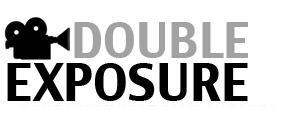Good evening! After our oral history fieldwork course today, I was sitting downstairs in one of the Butler Library lounges and stumbled across a flier advertising the blog “Double Exposure.” Intrigued by the title, I decided to look it up and learned that it is the Columbia undergraduate film journal.
Being an oral historian, I automatically gravitated to the “Interview” tab, wondering what form the dialogue would take. Since we’re so keyed in to multimedia these days, I sort of expected that there would be some audio or video component.
Instead, I was surprised that both articles were write ups with photographs derived from film frames. But that’s pretty standard to journals. And who knows if the interviews were conducted or recorded in person? Not a bad thing either way! Still, it left me wondering why online publications in general don’t do more with aurality.
Anyway, in the first interview, the writer set out a fairly straightforward question and answer piece. The knowledge base and intricacy of the questions also caught my attention, as they were used quite effectively.
In the second piece, the author took a completely different approach. Instead of transcribing the dialogue, he incorporated the occasional quotation into a much longer researched narrative. While nicely laid out, it left me wondering about the filmmaker’s “true” feelings beyond those paraphrased.
I wasn’t quite sure why I was struck by both articles in such a strange way until I came to think about how the field of oral history has influenced my understanding of interviewing and the communication of perspectives. I was looking for the personal side to the story.
True feelings? Intimate reflections? Maybe some people just don’t want to talk about that kind of thing! Especially for an interview on the topic of their films.
Well, I do come from a background in student journalism from my days editing and writing for the Concordiensis in college. I understand the form of the journalist interview–it should generally be concise, informative, and hard-hitting.
But in the past six months, have I completely forgotten what it means to write such a focused story? Now, it seems like (extensive) context is key, that shared authority is only ethical, and that the longer the answer, the better the question.
My classmates have described my interview style as professional and based in historical study. And I do practice deep listening and tend to trend lightly on the narrative, usually not intervening unless necessary. Can the two approaches truly be in accordance with each other? Are they more effective for oral history or journalism?
While it is certain that my methodology has its flaws and strengths, beyond that, I am left with the questions: As oral historians, what is our place amongst journalism–and film reviews for that matter? Can these fields, so similar one dimensionally, ever truly work well together? Is there any way to cut an oral history down to a digestible story without losing the richness of its meaning?
These are certainly not new areas of inquiry and have seen their fair share of analysis over the past fifty years. Although, they perhaps remain in a stage of constant reflection, revision, and study as we move further into the digital age.
In the end, I found it curious to notice how such well written articles left me still wishing for more, and wondering whether I will ever be able to return to the art of short form interviewing.
